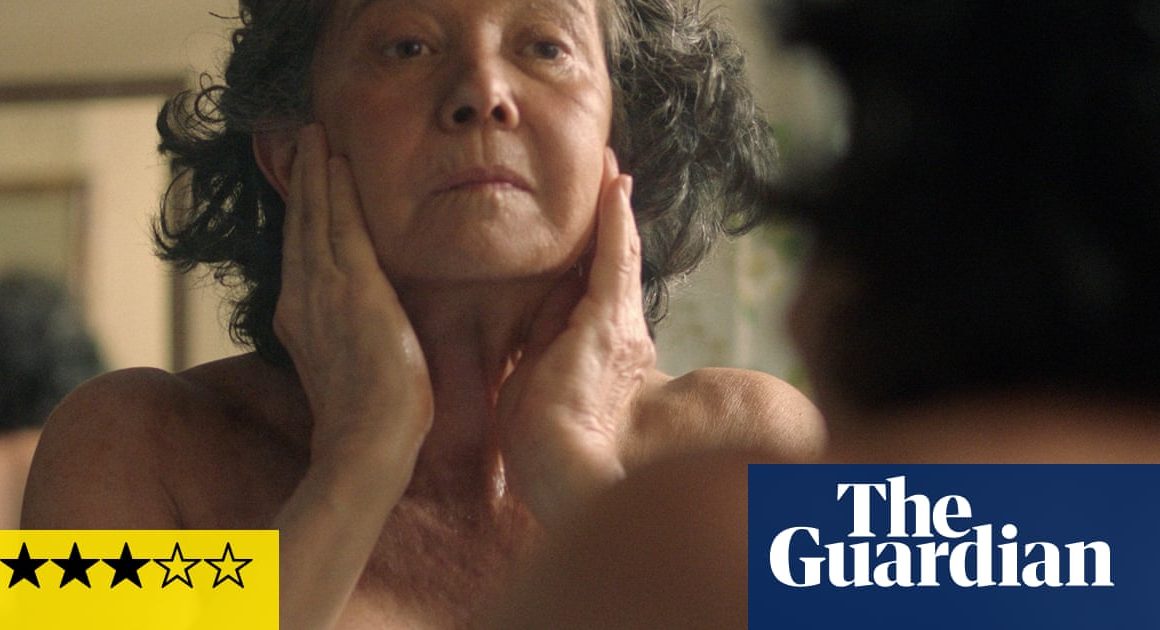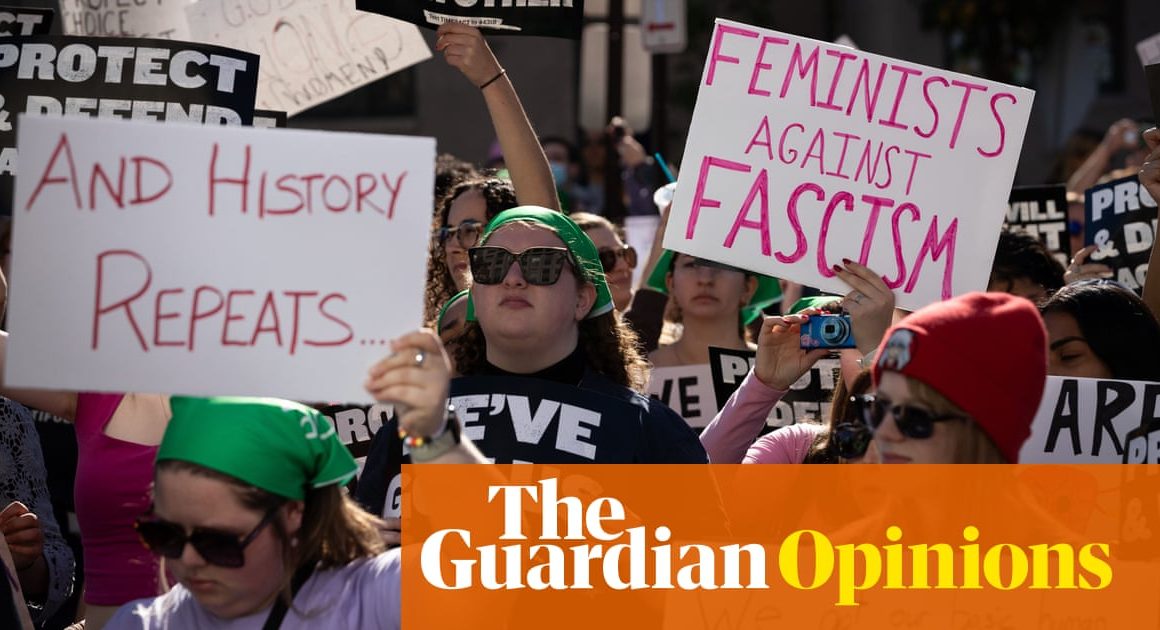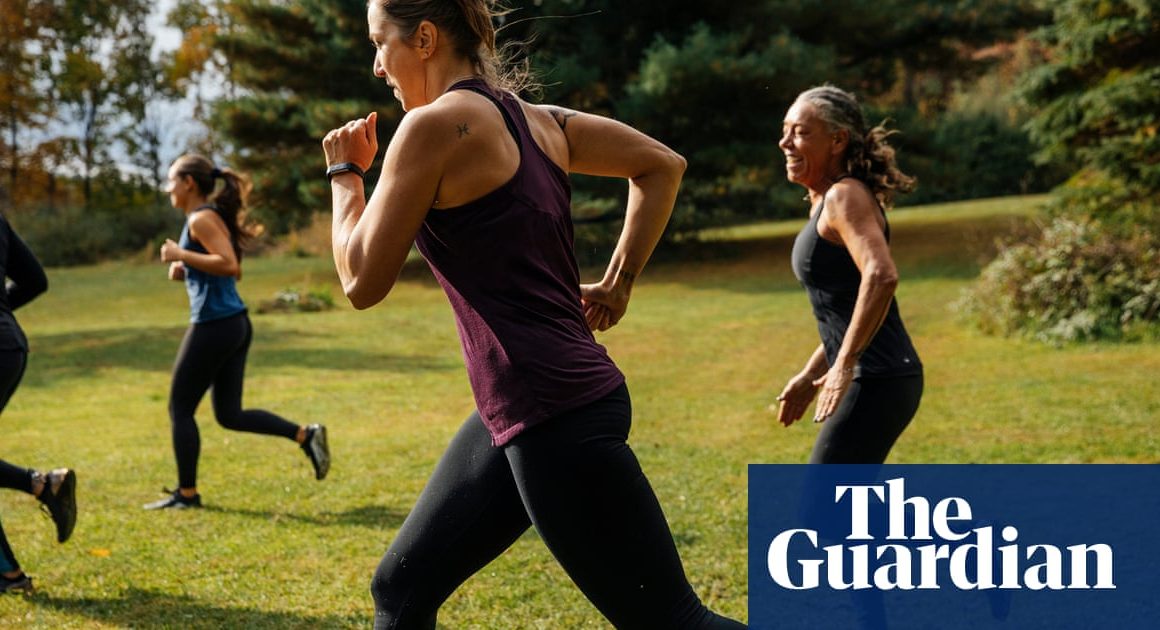One of my favourite moments from Doon Mackichan’s memoir is the day she auditions for a part in a hit sitcom. Waiting for her turn in a church hall in central London, she was already annoyed at the way the role was written – a “cougar”, an older woman trying to ensnare a younger man, who was, says Mackichan, portrayed as “desperate and ridiculous”. The director – someone she knew and had thought of as a friend – was standoffish, “playing the director power game”. She had to read the part several times, trying – and failing – to subvert it, the people in charge looking bored. Mackichan announced she was leaving, but flustered by her rage, she couldn’t find the exit. She slammed open the fire doors instead, setting off the alarms. I can picture her, angry but elated, standing on Tottenham Court Road with her two middle fingers up. It was the day she vowed never to audition for comedy again.
Mackichan has a history of being gloriously uncompromising. As a young actor: no nudity. As a working mother of three: demanding time on set to breastfeed and money for childcare. As a jobbing actor: turning down parts, such as the offer to play a murder victim, when she remains appalled at how many dead women there are on screen. And now, as a 62-year-old: refusing to do anything to her face, despite it being suggested that she have a little “freshen” up.
In person, when I turn up to her terrace house in south London, Mackichan is warm and funny, sharing a sofa with her staffie. Her book’s title, My Lady Parts, is a reference to all the stereotypical roles she has been asked to play, but also a blistering read on the business (it’s about to come out in paperback; after the hardback came out last year, Mackichan says, it lost her a job).
Mackichan is not an appeaser. She writes about the rudeness of fellow cast members and creepy male directors. She writes about how when the all-female comedy sketch show Smack the Pony – which she made with Sally Phillips and Fiona Allen – was a hit, Ricky Gervais, whose offers to come and write for the show had been politely declined, still turned up uninvited at rehearsals and took over. “It was astonishing,” she laughs. “It’s the entitlement of anyone who’s in the business who’s male and it hasn’t been as hard for them, to go: ‘Learn from me, I’m going to upgrade you from women’s comedy to comedy.’”
She might have had a very different career if she hadn’t turned so many jobs down, been happy to remain the “feed” in men’s comedy shows, hadn’t stood up to directors (such as David Mamet, who, she writes, had complained about how noisy she was: “Oh, I’m sorry, Mr Mamet. I forgot I’m a woman. I need to shush and be quiet.”). Does she ever have hints of regret? “I mean, I regret being a little bit poor,” she says, with a smile. “I regret not being able to go, I’m just going to buy a little flat in London. But I don’t regret not selling out.”
She has done brilliant stuff, from Smack the Pony and Toast of London to being a frequent collaborator with Armando Iannucci – she was in Chris Morris’s The Day Today and Brass Eye, and in various Alan Partridge series. Over the past decade or so, Mackichan has been a recurring character in the sitcom Two Doors Down, was nominated for a Bafta for her role in Plebs, and worked in theatre, but it has been a quiet summer, which suits her (she is recovering from an operation). Next year, she will be reprising her role in the Amazon show Good Omens. But another thing I got from her book was how financially precarious life is for a working actor, even one as acclaimed as Mackichan. “People think I’m fucking loaded,” she says with a laugh, though she’s quick to point out many people are worse off than her (her house in London is rented, but she owns a house in Hastings that she’s planning to sell).
During the pandemic, she claimed universal credit, a labyrinthine system that enraged her as much as navigating the TV industry. “I didn’t care about the indignity of being on universal credit, I just thought: ‘This is a nightmare.’ I just remember thinking, I have to stop, this is becoming my whole life, all I talk about is universal credit and how angry I am. It caused me so much stress. I thought, imagine if you couldn’t speak the language.”
Mackichan didn’t intend to become an actor or comedian, but looking back, there were clues. She blames the family’s grey parrot, she says with a laugh, which had a talent for mimicry that Mackichan clearly learned from. The family lived in Surrey before moving to Fife when Mackichan, the eldest of three, was 12, after her father become the manager of a textile mill. Her mother was an artist who raised the children. “We lived in houses that were too big for us to afford, so Mum would fill them with students in the summer. The garden was always full of children from different countries, and we had a huge dressing-up box – we just roamed around and put on shows. I think it was in my blood to be a bit of a mimic and a clown.” An outsider at school, she deployed comedy against the bullying she experienced.
At Manchester University in the 80s (she read drama, thinking she might go into writing or directing) she discovered politics and feminism. In her drama group, she says, “I was particularly blessed with amazing activist tutors who encouraged us to go on the marches, throw eggs at the Tories, get the bus to Greenham [Common, the women’s peace camp]. And the women in the third year were really formidable. I remember them telling me off, saying: ‘Why are you wearing those tight trousers? Is that for men?’”
It was all Brecht plays, experimental performance (“I was portraying syphilis in dance form”) and politics. “Manchester completely opened my eyes. It was wonderful.” Being annoyed that nobody had put their name down for an all-women cabaret night, Mackichan stepped up and essentially got a solo show. She wrote and performed monologues to an all-female crowd, stormed it and was hooked.
In London, performing gigs in pubs, she supported herself by waitressing, alongside other actors, and noticed how they were all waiting for the phone to ring. “I was like, I’m never going to be that person. It galvanised me.” She was living in a cheap flat, and she found she could live on two gigs a week. “I could stop waitressing and focus on standup. How can you be an artist [in London] now?”
Mackichan was often the only woman on a comedy bill, which could be “pretty awful, some really dreadful nights, thinking: ‘Do I want to do this?’ I remember being in Cambridge, the minute I walked on, it was: ‘Get your tits out.’” The noise level rising, as male-dominated audiences just switched off and started talking to each other, was almost worse. Some of her fellow (male) comics were great “and some were patronising, and some were horrible. You’d be in the back room at the Comedy Store, someone’s having a piss in the sink.” It became “a bit of a statement”, she says, to get up on stage, be funny, have a voice. In the late 80s and 90s, comedy was blowing up, “Edinburgh became rock’n’roll, alternative comedy became really cool. I was still playing weird little venues but I didn’t want to play their game, I didn’t want to do the big assembly rooms. I just wanted to keep experimenting.”
By then, she’d had some TV experience – cast in a Christmas special by TV comedians Hale and Pace, in which she was to play Cinderella, an experience notable mainly because Mackichan refused to shave her hairy legs when asked. She wonders if that would happen today, then adds: “I wonder if anyone would dare have hairy legs?” I find it so hard to imagine being a young, ambitious woman, relatively powerless in a competitive industry, but still sticking so resolutely to her guns. “I think Manchester really nailed down a good bed of feminism for me,” she says. “I’ll just do my thing, and if you want me on board, I’ll come.”
It was the same, later in her career when she pushed to be able to breastfeed on set, despite the eyerolls from the crew, or refused to do gratuitous nudity. On one crime thriller, she was asked to drop her towel after a sauna scene. The director, says Mackichan, was “persuasive, pushing. Those kind of things on set – suddenly the pressure on a young actress.” Now, there are intimacy coordinators, “which are helping a bit, but it’s really the stories. Just tell some different stories.” Maybe she stayed mostly in comedy, she says, “because of those decisions, maybe because of being difficult, maybe because of speaking out about storylines and things I found unacceptable, and upsetting directors. Maybe I have lost some dramas because of that. Comedy is less likely to ask you to get your tits out.”
Instead, women just weren’t considered that funny. At the start of her career, she was constantly being asked to play the straight character, setting up the men’s lines. “I would be the safe pair of hands, the receptionist, blah blah, trying to do something different with these terrible parts.” It’s not entirely different now, she says. “Oh OK, another desperate cougar or bitter old hag – it’s shocking.”
In the 90s, after hosting a successful radio show, she pitched ideas to commissioning editors, remembering one who just pointed to a photograph in his office of Dawn French and Jennifer Saunders as if to say, thanks, but we’ve got enough “comediennes”. She watched male peers being given pilots and TV shows. “Frank Skinner got several pilots, most of which failed. Come on, give the girls a go. I think it has changed, but I still think men pitching stuff has more gravitas.”
How did she cope with the endless frustration? “By being quite sensitive and then really putting the armour on and going out and being tough. I think I really wanted to get my kind of message across as well.” She wanted to talk about sexual politics, but also loved “the stupidity and the clowning. Suddenly Smack comes along, and that was utter joy.” The show, which was wonderfully silly and biting, with characters that felt fresh, won two International Emmy awards in the US. “That was fucking brilliant.”
The second year, they were on a table with Sacha Baron Cohen, whose character Ali G was also up for an award, and Mackichan says he walked off, furious, when they won. If they had been recognised in the US, it wasn’t quite the same with the comedy establishment in Britain. “Male shows are still seen as the seminal shows, as groundbreaking, and we were never on those lists.” Now, she says, it’s especially gratifying when she works with female writers and directors who grew up watching Smack the Pony and were inspired by it.
Mackichan is still fighting – she carries a permanent marker to deface adverts for aesthetics clinics and has resisted Botox and fillers, even though she admits it’s hard. “When I see myself on screen, like at a screening a couple of nights ago, it’s horrible because you go: ‘Christ, who is that very old lady?’ I just have to have a word with myself. We need to see those faces to stop being disgusted by it. It’s like a responsibility. If you’re 55, and you really want to get your fucking cheeks done, do it, I’m not judging you. But it’s an epidemic with younger women. I just really fight against feeling ashamed of ageing.”
She had spent her 30s burnt out, juggling jobs with motherhood, followed by a catastrophic period where she cared for her son while he was (successfully) treated for leukaemia, and the breakdown of her marriage. It’s frustrating to find herself now, free and experienced, but without many decent roles available. “There are so many good women who aren’t working. It’s a tragedy. You reach the top of your game, and if you’ve chosen to have children you’ve got them out the door … The culture’s really got to change. It’s hard to find those writers, and often they’re writing in the theatre.” She would like to think there are positive signs, “maybe more female-led production companies. Let’s say it is [improving], shall we? So we feel better.” She forces a laugh.
Why does she think she’s survived in the industry? “I think just a belief in what I’m doing, a really strong belief in remaining an artist,” she says. “And trying to be an artist is quite hard in this world.” Mackichan says she has been driven by a “creative engine”, to think “if I’m not going to do that, then I’ll just go back on the circuit, or I’ll write something”. Thrillingly, she never once worried about being seen as “difficult”. “It’s that thing of being a good girl and a likable girl, and fuck that. Why do we have to be?”
My Lady Parts: A Life Defying Stereotypes by Doon Mackichan is published by Canongate in paperback (£10.99). To support the Guardian buy your copy at bookshop.theguardian.com. P&P may apply












